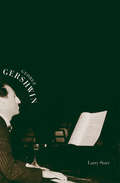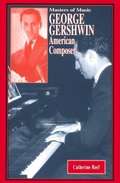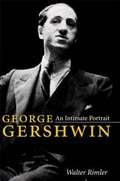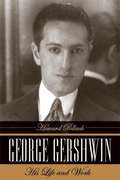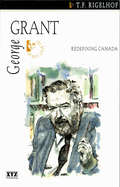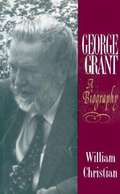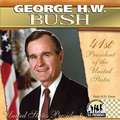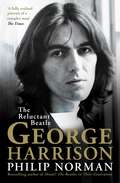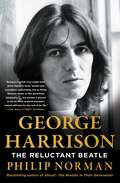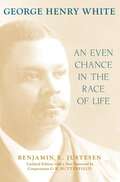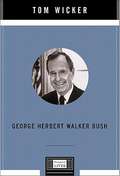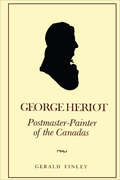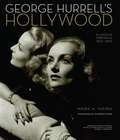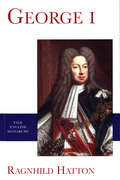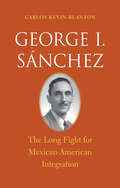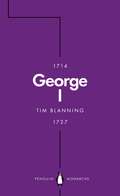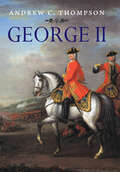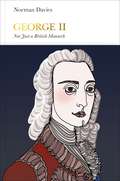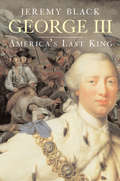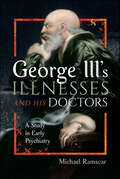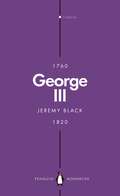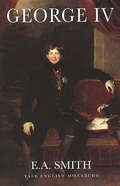- Table View
- List View
George Gershwin
by Larry StarrIn this welcome addition to the immensely popular Yale Broadway Masters series, Larry Starr focuses fresh attention on George Gershwin's Broadway contributions and examines their centrality to the composer's entire career. Starr presents Gershwin as a composer with a unified musical vision--a vision developed on Broadway and used as a source of strength in his well-known concert music. In turn, Gershwin's concert-hall experience enriched and strengthened his musicals, leading eventually to his great "Broadway opera,"Porgy and Bess. Through the prism of three major shows--Lady Be Good(1924),Of Thee I Sing(1931), andPorgy and Bess(1935)--Starr highlights Gershwin's distinctive contributions to the evolution of the Broadway musical. In addition, the author considers Gershwin's musical language, his compositions for the concert hall, and his movie scores for Hollywood in the light of his Broadway experience.
George Gershwin: American Composer
by Catherine ReefTraces the life of the American Jewish composer who created a new kind of music that has lasted beyond the fashion of his time.
George Gershwin: An Intimate Portrait (Music in American Life)
by Walter RimlerGeorge Gershwin lived with purpose and gusto, but with melancholy as well, for he was unable to make a place for himself--no family of his own and no real home in music. He and his siblings received little love from their mother and no direction from their father. Older brother and lyricist Ira managed to create a home when he married Leonore Strunsky, a hard-edged woman who lived for wealth and status. The closest George came to domesticity was through his longtime relationship with Kay Swift. She was his lover, musical confidante, and fellow composer. But she remained married to another man while he went endlessly from woman to woman. Only in the final hours of his life, when they were separated by a continent, did he realize how much he needed her. Fatally ill, unprotected by (and perhaps estranged from) Ira, he was exiled by Leonore from the house she and the brothers shared, and he died horribly and alone at the age of thirty-eight. Nor was Gershwin able to find a satisfying musical harbor. For years his songwriting genius could be expressed only in the ephemeral world of show business, as his brilliance as a composer of large-scale works went unrecognized by highbrow music critics. When he resolved this quandary with his opera Porgy and Bess, the critics were unable to understand or validate it. Decades would pass before this, his most ambitious composition, was universally regarded as one of music's lasting treasures and before his stature as a great composer became secure. In George Gershwin: An Intimate Portrait, Walter Rimler makes use of fresh sources, including newly discovered letters by Kay Swift as well as correspondence between and interviews with intimates of Ira and Leonore Gershwin. It is written with spirited prose and contains more than two dozen photographs.
George Gershwin: His Life and Work
by Howard PollackThis comprehensive biography of George Gershwin (1898-1937) unravels the myths surrounding one of America's most celebrated composers and establishes the enduring value of his music. Pollack's lively narrative describes Gershwin's family, childhood, and education; his early career as a pianist; his friendships and romantic life; his relation to various musical trends; his writings on music; his working methods; and his tragic death at the age of 38.
George Grant
by T. F. RigelhofGeorge Grants Lament for a Nation led some to call him a Red Tory and the dominant force behind the Canadian nationalist movement of the 1970s. Today, reading George Grants books helps us to understand the full implications of American-led, technology-driven globalization on everyday life.
George Grant: A Biography
by William ChristianThis book sheds light on Grant's early intellectual interests, the centrality of his pacifism, his struggle to educate himself as a philosopher (he studied history at Queen's University and law at Oxford), his ambivalent relationship to organized religion, his quarrels with York and McMaster Universities, and his attitude to John Diefenbaker.
George H. W. Bush: Forty-first President Of The United States
by Rebecca StefoffExamines the childhood, education, employment, and political career of the forty-first president.
George H.W. Bush (The United States Presidents)
by Heidi M.D. ElstonIn addition, his family and personal life, as well as his retirement years a disaster-relief fundraiser is highlighted. Easy-to-read text details Bush's military service during World War II and his political career as a member of the U.S. House of Representatives, U.S. ambassador to the United Nations, chairman of the Republican National Committee, chief U.S. liaison to China, director of the CIA, and vice president.
George Harrison: The Reluctant Beatle
by Philip NormanFrom the author of the million-copy selling Shout!: The Beatles in Their Generation and the bestselling John Lennon: The Life comes a revealing portrait of George Harrison, the most undervalued and mysterious Beatle. Despite being hailed as one of the best guitarists of his era, George Harrison, particularly in his early decades, battled feelings of inferiority. He was often the butt of jokes from his bandmates owing to his lower-class background and, typically, was allowed to contribute only one or two songs per Beatles album out of the dozens he wrote. Now, acclaimed Beatles biographer Philip Norman examines Harrison through the lens of his numerous self-contradictions. Compared to songwriting luminaries John Lennon and Paul McCartney he was considered a minor talent, yet he composed such masterpieces as &‘While My Guitar Gently Weeps&’ and &‘Here Comes the Sun&’, and his solo debut album &‘All Things Must Pass&’ achieved enormous success, appearing on many lists of the 100 best rock albums ever. Modern music critics place him in the pantheon of Sixties guitar gods alongside Eric Clapton, Jimi Hendrix, Keith Richards and Jimmy Page. Harrison railed against the material world yet wrote the first pop song complaining about income tax. He spent years lovingly restoring his Friar Park estate as a spiritual journey, but quickly mortgaged the property to help rescue a film project that would be widely banned as sacrilegious, Monty Python&’s Life of Brian. Harrison could be fiercely jealous, but not only did he stay friends with Eric Clapton when Clapton fell in love with Harrison's wife, Pattie Boyd, the two men grew even closer after Clapton walked away with her.Unprecedented in scope and filled with numerous colour photos, this rich biography captures George Harrison at his most multi-faceted: devoted friend, loyal son, master guitar-player, brilliant songwriter, cocaine addict, serial philanderer, global philanthropist, student of Indian mysticism, self-deprecating comedian and, ultimately, iconic artist and man beloved by millions.
George Harrison: The Reluctant Beatle
by Philip NormanFrom the premiere Beatles biographer—author of the New York Times bestseller John Lennon: The Life and Shout!: The Beatles in Their Generation—a rare and &“absorbing biography&” (Wall Street Journal) of George Harrison, the most misunderstood and mysterious Beatle, based on decades-long research and unparalleled access to inside sources.Despite being hailed as one of the best guitarists of his era, George Harrison, particularly in his early decades, battled feelings of inferiority. He was often the butt of jokes from his bandmates owing to his lower-class background and, typically, was allowed to contribute only one or two songs per Beatles album out of the dozens he wrote. Now, Philip Norman examines Harrison through the lens of his numerous self-contradictions in this &“keen and lovely tribute&” (Booklist, starred review). Compared to songwriting luminaries John Lennon and Paul McCartney he was considered a minor talent, yet he composed such masterpieces as &“While My Guitar Gently Weeps&” and &“Here Comes the Sun,&” and his solo debut album All Things Must Pass appears on many lists of the 100 best rock albums ever. Modern music critics place him in the pantheon of sixties guitar gods alongside Eric Clapton, Jimi Hendrix, Keith Richards, and Jimmy Page. Harrison railed against the material world yet wrote the first pop song complaining about income tax. He spent years lovingly restoring his Friar Park estate as a spiritual journey, but quickly mortgaged the property to help rescue a film project that would be widely banned as sacrilegious, Monty Python&’s Life of Brian. Harrison could be fiercely jealous, but not only did he stay friends with Eric Clapton when Clapton fell in love with Harrison&’s wife, Pattie Boyd, the two men grew even closer after Clapton walked away with her. Unprecedented in scope and filled with numerous color photos, this rich biography captures George Harrison at his most multi-faceted: devoted friend, loyal son, master guitar player, brilliant songwriter, cocaine addict, serial philanderer, global philanthropist, student of Indian mysticism, self-deprecating comedian, and, ultimately, iconic artist and man beloved by millions.
George Henry White: An Even Chance in the Race of Life (Southern Biography Series)
by Benjamin R. Justesen G. K. ButterfieldAlthough he was one of the most important African American political leaders during the last decade of the nineteenth century, George Henry White has been one of the least remembered. A North Carolina representative from 1897 to 1901, White was the last man of his race to serve in the Congress during the post-Reconstruction period, and his departure left a void that would go unfilled for nearly thirty years. At once the most acclaimed and reviled symbol of the freed slaves whose cause he heralded, White remains today largely a footnote to history. In this exhaustively researched biography, Benjamin R. Justesen rescues from obscurity the fascinating story of this compelling figure's life and accomplishments.The mixed-race son of a free turpentine farmer, White became a teacher, lawyer, and prosecutor in rural North Carolina. From these modest beginnings he rose in 1896 to become the only black member of the House of Representatives and perhaps the most nationally visible African American politician of his time. White was outspoken in his challenge to racial injustice, but, as Justesen shows, he was no militant racial extremist as antagonistic white democrats charged. His plea was always for simple justice in a nation whose democratic principles he passionately loved. A conservative by philosophy, he was a dedicated Republican to the end. After he retired from Congress, he remained active in the fight against racial discrimination, working with national leaderas of both races, from Booker T. Washington to the founders of the NAACP. Through judicious use of public documents, White's speeches, newspapers, letters, and secondary sources, Justesen creates an authoritative and balanced portrait of this complex man and proves him to be a much more effective leader than previously believed.
George Herbert Walker Bush
by Tom WickerNo one is more qualified to give a fully rounded, objective portrait of our forty-first president than Tom Wicker. A political correspondent for The New York Times for more than thirty years, Wicker was a first-hand witness to and reporter of George H. W. Bush’s political rise and presidential reign. In George Herbert Walker Bush, Wicker provides a richly drawn and succinct overview of Bush from his New England roots, his decorated service in World War II, and his successful oil businesses to his shift to politics and rapid rise within the Republican party. As he describes changes within the Republican party in recent decades, Wicker charts Bush’s career, including in-depth analysis of his campaign tactics and his gift for creating friendships and inspiring loyalty which, Wicker argues, has been the key to Bush’s success. The result is a fascinating, timely glimpse into one of the most powerful families in America today, complete with insights into the current reign of George W. Bush, the continued legacy of the Bush family, and contemporary American politics. .
George Herbert Walker Bush
by Tom WickerNo one is more qualified to give a fully rounded, objective portrait of our forty-first president than Tom Wicker. A political correspondent for The New York Times for more than thirty years, Wicker was a first-hand witness to and reporter of George H. W. Bush's political rise and presidential reign. In George Herbert Walker Bush, Wicker provides a richly drawn and succinct overview of Bush from his New England roots, his decorated service in World War II, and his successful oil businesses to his shift to politics and rapid rise within the Republican party. As he describes changes within the Republican party in recent decades, Wicker charts Bush's career, including in-depth analysis of his campaign tactics and his gift for creating friendships and inspiring loyalty which, Wicker argues, has been the key to Bush's success. The result is a fascinating, timely glimpse into one of the most powerful families in America today, complete with insights into the current reign of George W. Bush, the continued legacy of the Bush family, and contemporary American politics.
George Heriot: Postmaster-Painter of the Canadas
by Gerald FinleyGeorge Heriot (1759-1839), a Scot, is best known as a skilled landscape watercolourist and as the contentious deputy postmaster general of British North America from 1800 to 1816. He was also a travel writer (his Travels through the Canadas was published in 1807) and a poet. In this volume, a combination of biography and art history, Gerald Finley presents, for the first time, a rounded picture of Heriot, revealing his motives and ideals while also illuminating the texture of life in Canada during the early years of settlement. In describing Heriot's several roles as artist, administrator, patriot, spy, Finley presents a portrait of an eighteenth-century gentleman whose superficial desires were for an active public life but whose deeper yearnings were for a life of contemplation. As a member of the gentry it was natural that Heriot found his way into public service, for which he was suited both by education and by upbringing. Nevertheless, his public career did not always run smoothly and it ended in frustration and sadness. However, through his writing and especially his art Heriot found welcome relief from the tensions of his public duties. Indeed, Heriot's chief importance lies in his art. Trained as a topographical artist, he was an important exponent of the picturesque landscape. As a mode of vision the Picturesque furnished him with a special way of looking at recording the Canadian scene – to him Canada possessed the qualities of Arcadia. This viewpoint served both as aesthetic consolation and as stimulus to inspiration. This volume serves to recognize Heriot's artistic achievement and to accord him the place he deserves in the history of Canadian art and of the country itself.
George Hurrell's Hollywood: Glamour Portraits 1925-1992
by Mark A. Vieira Sharon StoneFabulous montage of new insights, new portraits, and behind-the-scenes stories spanning Hurrell's entire career.
George I
by Ragnhild HattonIn 1714 George Ludwig, the fifty-eight-year-old elector of Brunswick-Luneburg, became, as George I, the first of the Hanoverian dynasty to rule Britain. Until his death in 1727 George served as both elector of Hanover and British monarch. An enigmatic figure whose real character has long been concealed by anti-Hanoverian propaganda, George emerges in this groundbreaking biography as an impressive ruler who welcomed the responsibilities the accession brought him and set out to bring culture to what he considered the unsophisticated English nation.Ragnhild Hatton's biography is the only comprehensive account of George's life and reign. It draws on a wide range of archival sources in several languages to illuminate the fascinating details of George's early life and dynastic crises, his plans and ambitions for the British nation, the impact of his rationalist ideas, and his accomplishments as king. The book also examines the king's private life, his family relationships in both Prussia and England, his private interest in music and the arts, and the improvement of his British and Hanoverian properties.
George I. Sánchez
by Carlos Kevin BlantonGeorge I. Sánchez was a reformer, activist, and intellectual, and one of the most influential members of the "Mexican American Generation" (1930-1960). A professor of education at the University of Texas from the beginning of World War II until the early 1970s, Sánchez was an outspoken proponent of integration and assimilation. He spent his life combating racial prejudice while working with such organizations as the ACLU and LULAC in the fight to improve educational and political opportunities for Mexican Americans. Yet his fervor was not always appreciated by those for whom he advocated, and some of his more unpopular stands made him a polarizing figure within the Latino community.Carlos Blanton has published the first biography of this complex man of notable contradictions. The author honors Sánchez's efforts, hitherto mostly unrecognized, in the struggle for equal opportunity, while not shying away from his subject's personal faults and foibles. The result is a long-overdue portrait of a towering figure in mid-twentieth-century America and the all-important cause to which he dedicated his life: Mexican American integration.
George I: The Lucky King (Penguin Monarchs)
by Tim BlanningGeorge I was not the most charismatic of the Hanoverian monarchs to have reigned in England but he was probably the most important. He was certainly the luckiest.Born the youngest son of a landless German duke, he was taken by repeated strokes of good fortune to become, first the ruler of a major state in the Holy Roman Empire of the German Nation and then the sovereign of three kingdoms (England, Ireland and Scotland). Tim Blanning's incisive short biography examines George's life and career as a German prince, and as King. Fifty-four years old when he arrived in London in 1714, he was a battle-hardened veteran, who put his long experience and deep knowledge of international affairs to good use in promoting the interests of both Hanover and Great Britain. When he died, his legacy was order and prosperity at home and power and prestige abroad. Disagreeable he may have been to many, but he was also tough, determined and effective, at a time when other European thrones had started to crumble.
George II: King and Elector (The English Monarchs Series)
by Andrew C. ThompsonDespite a long and eventful reign, Britain's George II is a largely forgotten monarch, his achievements overlooked and his abilities misunderstood. This landmark biography uncovers extensive new evidence in British and German archives, making possible the most complete and accurate assessment of this thirty-three-year reign. Andrew C. Thompson paints a richly detailed portrait of the many-faceted monarch in his public as well as his private life. Born in Hanover in 1683, George Augustus first came to London in 1714 as the new Prince of Wales. He assumed the throne in 1727, held it until his death in 1760, and has the distinction of being Britain's last foreign-born king and the last king to lead an army in battle. With George's story at its heart, the book reconstructs his thoughts and actions through a careful reading of the letters and papers of those around him. Thompson explores the previously underappreciated roles George played in the political processes of Britain, especially in foreign policy, and also charts the intricacies of the king's complicated relationships and reassesses the lasting impact of his frequent return trips to Hanover. George II emerges from these pages as an independent and cosmopolitan figure of undeniable historical fascination.
George II: Not Just a British Monarch (Penguin Monarchs)
by Norman DaviesFrom the celebrated historian and author of Europe: A History, a new life of George IIGeorge II, King of Great Britain and Ireland and Elector of Hanover, came to Britain for the first time when he was thirty-one. He had a terrible relationship with his father, George I, which was later paralleled by his relationship to his own son. He was short-tempered and uncultivated, but in his twenty-three-year reign he presided over a great flourishing in his adoptive country - economic, military and cultural - all described with characteristic wit and elegance by Norman Davies. (George II so admired the Hallelujah chorus in Handel's Messiah that he stood while it was being performed - as modern audiences still do.) Much of his attention remained in Hanover and on continental politics, as a result of which he was the last British monarch to lead his troops into battle, at Dettingen in 1744.
George III
by Jeremy BlackThe sixty-year reign of George III (1760-1820) witnessed and participated in some of the most critical events of modern world history: the ending of the Seven Years' War with France, the American War of Independence, the French Revolutionary Wars, the campaign against Napoleon Bonaparte and battle of Waterloo in 1815, and Union with Ireland in 1801. Despite the pathos of the last years of the mad, blind, and neglected monarch, it is a life full of importance and interest.Jeremy Black's biography deals comprehensively with the politics, the wars, and the domestic issues, and harnesses the richest range of unpublished sources in Britain, Germany, and the United States. But, using George III's own prolific correspondence, it also interrogates the man himself, his strong religious faith, and his powerful sense of moral duty to his family and to his nation. Black considers the king's scientific, cultural, and intellectual interests as no other biographer has done, and explores how he was viewed by his contemporaries. Identifying George as the last British ruler of the Thirteen Colonies, Black reveals his strong personal engagement in the struggle for America and argues that George himself, his intentions and policies, were key to the conflict.
George III's Illnesses and his Doctors: A Study in Early Psychiatry
by Michael RamscarIn the late eighteenth century mental illness was treated with brutal and inhumane methods by ‘mad-doctors’, and the treatment of George III was no exception. George III’s Illnesses and His Doctors provides an insightful, forensic and sympathetic picture of how and why members of the royal family turned in desperation to an unqualified quack practitioner, James Lucett, in the hope of finding a cure for the king’s ‘insanity’. Much has been written in the past about ‘Mad King George’. This book brings fresh evidence and new understanding to the case of the ‘mad’ king. Lucett’s claims were tested in psychiatry’s first ‘therapeutic trial’ and science was invoked in an attempt to improve understanding of the roots of insanity. The results were mixed but nevertheless George III’s case and the subsequent career of the deeply flawed Lucett were important elements in the revolutionary change in attitudes to the treatment of the insane which came about as the nineteenth century progressed. Based closely on primary source material, George III’s Illnesses and His Doctors is a moving story of human suffering but also of efforts to challenge medical orthodoxy and to improve understanding of mental illness. Some of the issues raised in the early nineteenth century remain to be resolved now.
George III: Madness and Majesty (Penguin Monarchs)
by Jeremy BlackKing of Britain for sixty years and the last king of what would become the United States, George III inspired both hatred and loyalty and is now best known for two reasons: as a villainous tyrant for America's Founding Fathers, and for his madness, both of which have been portrayed on stage and screen.In this concise and penetrating biography, Jeremy Black turns away from the image-making and back to the archives, and instead locates George's life within his age: as a king who faced the loss of key colonies, rebellion in Ireland, insurrection in London, constitutional crisis in Britain and an existential threat from Revolutionary France as part of modern Britain's longest period of war.Black shows how George III rose to these challenges with fortitude and helped settle parliamentary monarchy as an effective governmental system, eventually becoming the most popular monarch for well over a century. He also shows us a talented and curious individual, committed to music, art, architecture and science, who took the duties of monarchy seriously, from reviewing death penalties to trying to control his often wayward children even as his own mental health failed, and became Britain's longest reigning king.
George IV
by E. A. SmithThis engrossing biography of George IV, king of England from 1820 to 1830, gives a full and objective reassessment of the monarch's character, reputation, and achievement. Previous writers have tended to accept the unfavorable verdicts of the king's contemporaries that he was a dissolute, pleasure-loving dilettante and a feeble and ineffective ruler who was responsible for the decline of the power and reputation of the monarchy in the early nineteenth century. Now E.A. Smith offers a new view of George IV, one that does not minimize the king's faults but focuses on the positive qualities of his achievement in politics and in the patronage of the arts.Smith explores the roots of the king's character and personality, stressing the importance of his relationship with his parents and twelve surviving siblings. He examines the king's important contributions to the cultural enhancement of his capital and his encouragement of the major artistic, literary, and scholarly figures of his time. He reassesses the king's role as constitutional monarch, contending that it was he, rather than Victoria and Albert, who created the constitutional monarchy of nineteenth-century Britain and began the revival of its popularity. Smith's biography not only illuminates the character of one of the most colorful of Britain's rulers but also contributes to the history of the British monarchy and its role in the nation's life.
